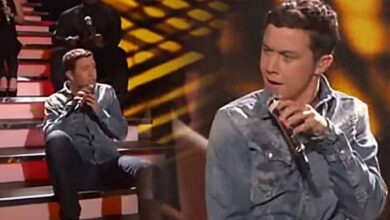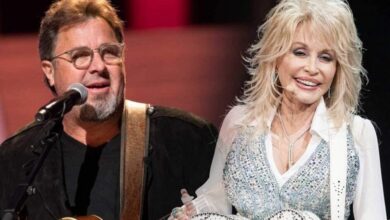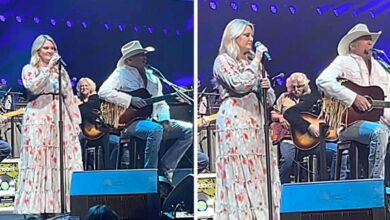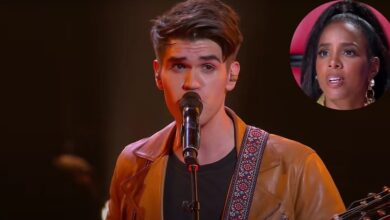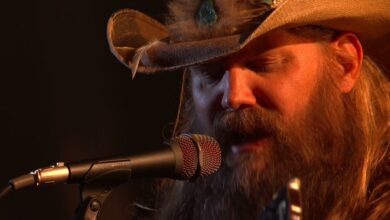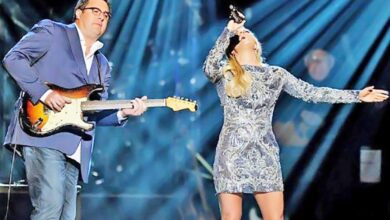Kelly Clarkson’s Rendition of ‘The Dance’ Moved Garth Brooks to Tears
During the 43rd Kennedy Center Honors, which took place on June 6, 2021, a defining moment emerged through Kelly Clarkson’s heart-stirring performance. Celebrating the remarkable contributions to the arts, the event honored Garth Brooks alongside other luminaries like Debbie Allen, Joan Baez, Dick Van Dyke, and the admired violinist Midori. The evening was skillfully hosted by Gloria Estefan, showcasing a plethora of performances by some of the industry’s finest, such as Gladys Knight, Emmylou Harris, and the renowned a cappella group Pentatonix. Each artist’s performance reflected not only their individual artistry but also the impact these honorees have made on the cultural landscape of the United States.
What made Clarkson’s rendition of Brooks’ “The Dance” particularly memorable was the emotional resonance she conveyed. Originally released in 1989, “The Dance” captures profound themes of love, loss, and the bittersweet nature of life, presenting a narrative that resonates deeply with listeners. Clarkson’s interpretation was characterized by a vulnerability that allowed her to connect with the song on both a personal and artistic level. Accompanied solely by piano, her performance showcased the purity and strength of her vocals, drawing the audience into a shared moment of reflection and emotion. This approach highlighted the song’s core essence, transforming it into a heartfelt tribute that spoke not only to Brooks but to anyone who has navigated the complexities of relationships.
As Garth Brooks watched Clarkson’s performance, it was clear that the moment struck a chord within him. Known for his penchant for storytelling through music, Brooks has an innate ability to convey emotional depth in his songs. The sight of him holding back tears as Clarkson sang symbolizes the profound connection artists often share with their work, revealing the power that live performances can have in evoking raw emotions. This moment was a testament to music’s ability to transcend barriers, resonating deeply within hearts and minds, and emphasizing the shared human experience of joy, sorrow, and nostalgia.
Clarkson’s relationship with the song added another layer of significance to her performance. In her personal life, she has often spoken about the impact music has had on her journey through healing and self-discovery, especially following her divorce from Brandon Blackstock. During difficult times, she found solace in songs like “The Dance,” as they encapsulated feelings she was grappling with. This connection allowed Clarkson to deliver an authentic performance at the Kennedy Center Honors—a performance that served as both a tribute to Brooks and a representation of her own narrative of transformation and resilience.
Kelly Clarkson, born on April 24, 1982, in Fort Worth, Texas, first captured national attention in 2002 when she became the inaugural winner of “American Idol.” Her victory was a launching pad that propelled her into a successful career characterized by numerous chart-topping hits. Iconic songs like “Since U Been Gone,” “Stronger (What Doesn’t Kill You),” and “Piece by Piece” have established her as a formidable presence in the music industry, showcasing her exceptional vocal range and songwriting capabilities. Over the years, Clarkson has amassed a diverse array of accolades, including multiple Grammy Awards, which not only reinforce her musical talents but also her influence on contemporary pop and country music.
Beyond her singing career, Clarkson has effortlessly expanded her brand into television. Hosting “The Kelly Clarkson Show” and taking on the role of a coach on NBC’s “The Voice” has enabled her to cultivate a broad audience, embracing a multi-faceted approach to her career. Clarkson’s approachable nature and genuine personality have resonated with viewers, allowing her to build a strong connection with fans that extends beyond her musical performances.
The significance of Clarkson’s tribute during the Kennedy Center Honors reflects her artistic versatility and her deep appreciation for musical heritage. The ability to invoke authentic emotions while maintaining integrity to the original work showcases her talent as both a performer and a storyteller. Clarkson’s fresh interpretation of “The Dance” not only pays homage to Brooks’ artistry but also infuses it with her voice, demonstrating a shared spirit that celebrates the timelessness of music across generations.
Audience members and viewers were enveloped by the warmth and sincerity of Clarkson’s performance. On that night, music became a vessel for emotion, allowing everyone present to experience a powerful connection that transcended time and space. Her artistry exemplified the magic of live performance—how a single song can evoke memories, foster connections, and encapsulate the vast spectrum of human experience. It felt almost as if the entire evening was a collective memory—a moment in time forged through rhythm, lyrics, and emotion.
The Kennedy Center Honors, along with Clarkson’s tribute, reflected the enduring legacy of music and its ability to unite us all. Moments like these spotlight the intricate web of influence that exists among artists, showcasing how seasoned performers can inspire and uplift emerging talents. For Clarkson, this performance served not only as a tribute to Garth Brooks but also as a milestone in her artistic journey—a reminder of the power that music holds in shaping connections, narratives, and shared experiences that bind us together.
Ultimately, this iconic event showcased the profound relationship between artists and the music that shapes their lives. Clarkson’s tribute to Brooks encapsulated the essence of what it means to be part of a larger musical community—one where the past informs the present, creating a rich tapestry of stories told through song. In honoring Brooks, Clarkson not only celebrated his contributions to the world of music but also solidified her place in the ongoing narrative of artistic expression—an ever-evolving dialogue that continues to inspire generations.
?
